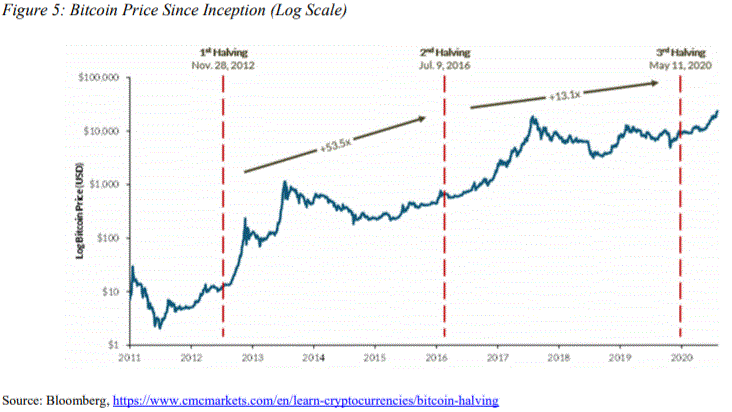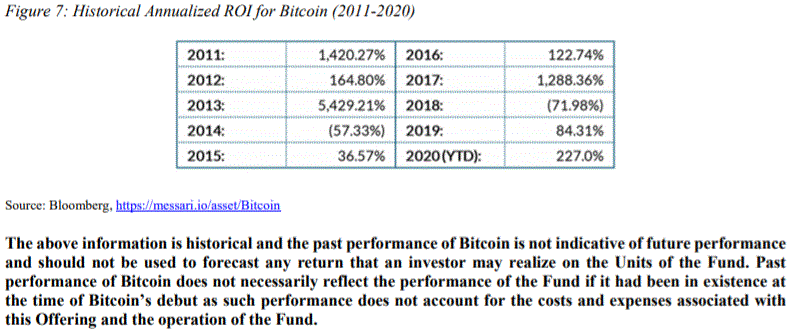The following content is excerpted from the prospectus of Bitcoin Trust dated December 30, 2020 filed on SEDAR.
Manager indicated below means Ninepoint Partners LP, the trustee, manager and promoter of the Fund
Bitcoin Use-Case Examples
Bitcoin is accepted by merchants and thus can be used to pay for goods and services. Bitcoin is also used to send
money around the world without the need for an intermediary like a bank. This makes Bitcoin attractive for many use
cases, such as remittances between parties in different countries. Bitcoin is also increasingly popular in countries
where the local currency is inflationary, or where the political regime is unstable or where the government and
financial infrastructure is underdeveloped or unevenly distributed and thus difficult to access for much of the
population. For example, in Nigeria, only three in ten people have bank accounts and six in ten people live below the
poverty line. Yet, Nigeria is one of the largest beneficiaries of remittance payments, receiving over $25 billion per
year. Recent social unrest and mass protest, combined with this backdrop, have fueled significant growth in Bitcoin
adoption.
Another use-case for Bitcoin is as a store of value and a hedge against inflation. While Bitcoin is closing in on alltime highs in USD$ and CAD$ terms, it has already exceeded its all-time highs in the currencies of many other
countries, including Brazil, Argentina, Turkey, Venezuela, Russia and Colombia. All of these countries have dealt
with high inflation or currency volatility in recent years. Bitcoin is global and so it is important to view it through a
global lens. For many people living in these countries where the currency is being debased, Bitcoin is one of the few
real "off ramps" to preserve wealth for the long term.
Importantly, although the price of Bitcoin is (as of December 24, 2020) around $23,400, individual users can own a
fraction of a Bitcoin. In fact, it may be owned down to eight decimal places, or one hundredth million of a Bitcoin,
also known as a 'Satoshi.' The potential for Bitcoin to be used for micropayments or for small dollar transactions such
as remittances is possible because of Bitcoin's high divisibility.
Retail Growth Supported by Changing Demographics
According to Coldwell Banker, over the coming decades, approximately $68 trillion in wealth will be transferred from
Baby Boomers to their Millenial children.11 This generation is more inclined to invest in Bitcoin over other asset
classes, including gold. According to a recent poll by deVere Group, a financial consultancy, "more than two-thirds
(67%) of the 700+ millennial clients surveyed said that they think Bitcoin competes better against gold as a safe-haven
asset."
According to a recent survey, 45% of U.S. citizens who responded are familiar with Bitcoin, up from 34% in 2017.
Coinbase, a retail-oriented cryptocurrency platform, has seen an increase in users, reporting 35 million users, up
from 13 million in 2017.
Bitcoin: Growing Acceptance as a Digital Alternative to Gold
Like gold, Bitcoin is a scarce asset with a limited supply that takes energy and time to produce and is thus viewed
increasingly by investors as an attractive and 'digital' alternative to gold. This is especially true given the
macroeconomic backdrop of a low-rate environment and high levels of monetary and fiscal intervention into the
economy. Like gold, Bitcoin does not generate any cash flow however in a low rate environment, the opportunity cost
of not owning a so-called risk-free asset declines significantly thus making assets like Bitcoin and gold more attractive.
However, unlike gold, Bitcoin is easily transferable at a low cost, has low storage costs and is impossible to forge.
Moreover, whereas the known use cases for gold are limited, Bitcoin is an open-source protocol with a lively
ecosystem of developers, companies and users which are adding to its utility. This investment thesis, that Bitcoin is a
form of "digital gold" is becoming increasingly widely accepted by large financial institutions.
On November 20, 2020, Rick Rieder, CIO for fixed income at Blackrock, the largest asset manager in the world, said
that Bitcoin could 'take the place of gold to a large extent," because "it's so much more functional than passing a bar
of gold around." This echoed the comment of outgoing SEC chairman Jay Clayton, who said on November 19, 2020
that Bitcoin was not only a "payment mechanism," but also a "store of value."
Bitcoin Historical Price Activity
Bitcoin is one of the best performing asset classes of the past decade, growing from $nil per Bitcoin to $23,405 per
Bitcoin and an approximate $441 billion market capitalization.18 It is currently enjoying its longest uninterrupted
stretch above $10,000 per Bitcoin at over 145 days. As of writing (December 24, 2020) Bitcoin has only spent one
day at a higher price.

Source: Prospectus of Bitcoin Trust Sdated December 30, 2020 filed on SEDAR.
The Manager believes that recent strength in Bitcoin is driven by institutional investors and other large holders (i.e.
corporate treasury purchases such as Microstrategy and Square) who are seeking out a financial investment in an asset
that has proven to be a good store of value both during this volatile year and over the long run. Of course, past
performance is no guarantee of future returns. However, recent developments, such as PayPal rolling out Bitcoin
buying and selling for its 300 million+ users suggests that there is new and sustained demand for Bitcoin. Whereas
during previous cycles of strong price appreciation, the search demand for Bitcoin spiked along with its price, during
this most recent cycle there has been little evidence of that, suggesting that broad based retail demand has not yet
come into the marketplace.
Bitcoin Return on Investment
In seven of the past nine years, Bitcoin has had a positive ROI exceeding 35%. YTD in 2020, Bitcoin has exceeded a
200% ROI.

Source: Prospectus of Bitcoin Trust Sdated December 30, 2020 filed on SEDAR.